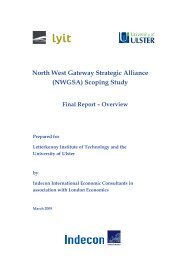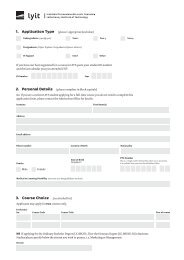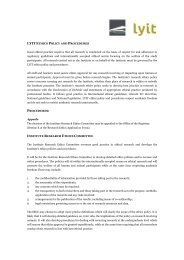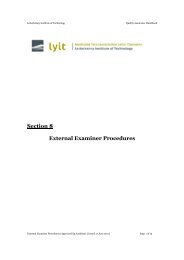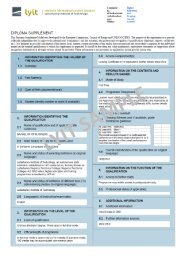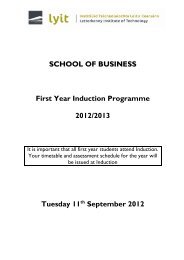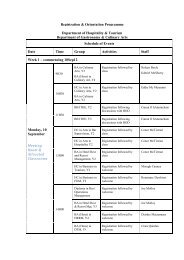Electronic & Mechanical Engineering - Letterkenny Institute of ...
Electronic & Mechanical Engineering - Letterkenny Institute of ...
Electronic & Mechanical Engineering - Letterkenny Institute of ...
Create successful ePaper yourself
Turn your PDF publications into a flip-book with our unique Google optimized e-Paper software.
COMPUTER <strong>Engineering</strong><br />
course title<br />
Bachelor <strong>of</strong> <strong>Engineering</strong> in<br />
Computer <strong>Engineering</strong><br />
national framework level<br />
7<br />
cao code<br />
ly627<br />
duration<br />
3 years<br />
number <strong>of</strong> places<br />
40<br />
awarding body<br />
lyit<br />
points in recent years<br />
year final median<br />
2009/10 aqa 205<br />
2010/11 aqa 255<br />
2011/12 140 230<br />
Is this the course for you<br />
Computer systems are at the heart <strong>of</strong><br />
everyday life and constantly changing<br />
– so those who work with them are not<br />
only technically skilled and logical,<br />
they are also imaginative people who<br />
enjoy finding solutions and changing<br />
how we do things. How can we make<br />
the computer better How can different<br />
banking systems talk to each other<br />
This area has some cross-over with<br />
electronic engineering and computer<br />
science in relation to the theory <strong>of</strong><br />
computing but computer engineering<br />
places much more emphasis on<br />
understanding computer systems and<br />
hardware such as circuit boards, mother<br />
boards, CD drives, memory boards and<br />
hard drives and computer-based systems<br />
such as those found in cars, planes,<br />
appliances and phones.<br />
Minimum entry requirements<br />
Pass (od3 or better) in 5 Leaving<br />
Certificate subjects, including passes<br />
in Mathematics and in either Irish or<br />
English (or an equivalent qualification).<br />
The minimum points for entry is<br />
140 points.<br />
Career opportunities<br />
There is a strong and growing demand<br />
for computer engineering graduates<br />
locally, nationally and internationally.<br />
As a computer engineering technician/<br />
technologist, you could work on computer<br />
systems at any stage <strong>of</strong> development:<br />
1 designing new features for PCs, wireless<br />
communications, games technology or<br />
diagnostic equipment for health care.<br />
1 digital signals processing to create<br />
sounds and images for use with<br />
end products.<br />
1 testing and working on quality control<br />
<strong>of</strong> equipment such as disk drives or<br />
computer chips.<br />
1 maintaining hardware and s<strong>of</strong>tware<br />
systems used by the financial<br />
services industry.<br />
1 installing and managing computer<br />
networking systems for large companies.<br />
1 working with marketing or customer<br />
services departments helping with sales,<br />
purchasing and technical support.<br />
1 computer programming – while<br />
engineers have less programming<br />
experience than computer science<br />
graduates, they also work in this area and<br />
their strong understanding <strong>of</strong> hardware<br />
is a benefit when working on the overall<br />
operation <strong>of</strong> systems.<br />
Visit www.computer.org and<br />
www.steps.ie for more career ideas.<br />
122



